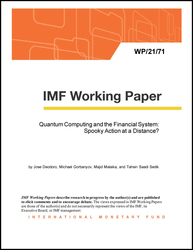
Quantum Computing and the Financial System: Spooky Action at a Distance?
Quantum Computing and the Financial System: Spooky Action at a Distance?
READ MORE...
Volume/Issue:
Volume 2021
Issue 071
Publication date: March 2021
ISBN: 9781513572727
$18.00
Add to Cart by clicking price of the language and format you'd like to purchase
Available Languages and Formats
| English |
Prices in red indicate formats that are not yet available but are forthcoming.
Topics covered in this book
This title contains information about the following subjects.
Click on a subject if you would like to see other titles with the same subjects.
Economics- Macroeconomics , Economics / General , International - Economics , Emigration and Immigration , quantum computing , quantum-safe encryption , cybersecurity , fintech , , fintech , functioning quantum computer , computing technology , quantum machine , encryption standard , hardware capability , cloud service , Computer science , Migration , Financial sector , Global
Summary
The era of quantum computing is about to begin, with profound implications for the global economy and the financial system. Rapid development of quantum computing brings both benefits and risks. Quantum computers can revolutionize industries and fields that require significant computing power, including modeling financial markets, designing new effective medicines and vaccines, and empowering artificial intelligence, as well as creating a new and secure way of communication (quantum Internet). But they would also crack many of the current encryption algorithms and threaten financial stability by compromising the security of mobile banking, e-commerce, fintech, digital currencies, and Internet information exchange. While the work on quantum-safe encryption is still in progress, financial institutions should take steps now to prepare for the cryptographic transition, by assessing future and retroactive risks from quantum computers, taking an inventory of their cryptographic algorithms (especially public keys), and building cryptographic agility to improve the overall cybersecurity resilience.
Copyright © 2010 - 2026
Powered by:
AIDC



